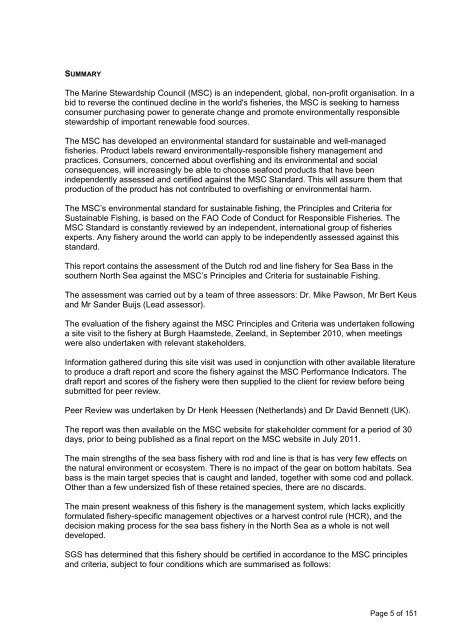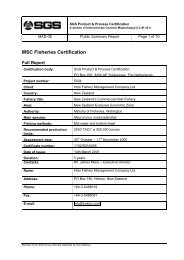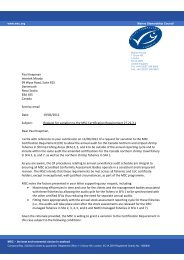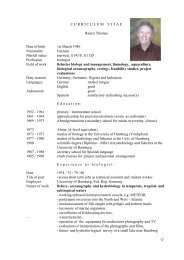SGS Product & Process Certification - Marine Stewardship Council
SGS Product & Process Certification - Marine Stewardship Council
SGS Product & Process Certification - Marine Stewardship Council
You also want an ePaper? Increase the reach of your titles
YUMPU automatically turns print PDFs into web optimized ePapers that Google loves.
SUMMARY<br />
The <strong>Marine</strong> <strong>Stewardship</strong> <strong>Council</strong> (MSC) is an independent, global, non-profit organisation. In a<br />
bid to reverse the continued decline in the world's fisheries, the MSC is seeking to harness<br />
consumer purchasing power to generate change and promote environmentally responsible<br />
stewardship of important renewable food sources.<br />
The MSC has developed an environmental standard for sustainable and well-managed<br />
fisheries. <strong>Product</strong> labels reward environmentally-responsible fishery management and<br />
practices. Consumers, concerned about overfishing and its environmental and social<br />
consequences, will increasingly be able to choose seafood products that have been<br />
independently assessed and certified against the MSC Standard. This will assure them that<br />
production of the product has not contributed to overfishing or environmental harm.<br />
The MSC‘s environmental standard for sustainable fishing, the Principles and Criteria for<br />
Sustainable Fishing, is based on the FAO Code of Conduct for Responsible Fisheries. The<br />
MSC Standard is constantly reviewed by an independent, international group of fisheries<br />
experts. Any fishery around the world can apply to be independently assessed against this<br />
standard.<br />
This report contains the assessment of the Dutch rod and line fishery for Sea Bass in the<br />
southern North Sea against the MSC‘s Principles and Criteria for sustainable Fishing.<br />
The assessment was carried out by a team of three assessors: Dr. Mike Pawson, Mr Bert Keus<br />
and Mr Sander Buijs (Lead assessor).<br />
The evaluation of the fishery against the MSC Principles and Criteria was undertaken following<br />
a site visit to the fishery at Burgh Haamstede, Zeeland, in September 2010, when meetings<br />
were also undertaken with relevant stakeholders.<br />
Information gathered during this site visit was used in conjunction with other available literature<br />
to produce a draft report and score the fishery against the MSC Performance Indicators. The<br />
draft report and scores of the fishery were then supplied to the client for review before being<br />
submitted for peer review.<br />
Peer Review was undertaken by Dr Henk Heessen (Netherlands) and Dr David Bennett (UK).<br />
The report was then available on the MSC website for stakeholder comment for a period of 30<br />
days, prior to being published as a final report on the MSC website in July 2011.<br />
The main strengths of the sea bass fishery with rod and line is that is has very few effects on<br />
the natural environment or ecosystem. There is no impact of the gear on bottom habitats. Sea<br />
bass is the main target species that is caught and landed, together with some cod and pollack.<br />
Other than a few undersized fish of these retained species, there are no discards.<br />
The main present weakness of this fishery is the management system, which lacks explicitly<br />
formulated fishery-specific management objectives or a harvest control rule (HCR), and the<br />
decision making process for the sea bass fishery in the North Sea as a whole is not well<br />
developed.<br />
<strong>SGS</strong> has determined that this fishery should be certified in accordance to the MSC principles<br />
and criteria, subject to four conditions which are summarised as follows:<br />
Page 5 of 151





